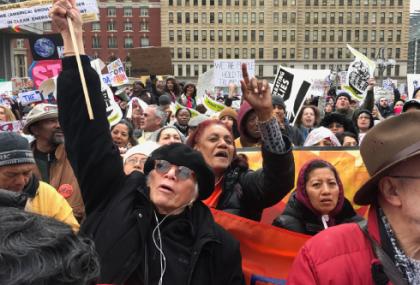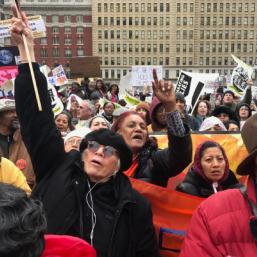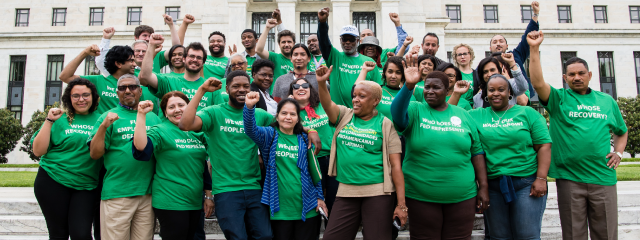Blog


Last week, the Fair Workweek Initiative (FWI), anchored by the Center for Popular Democracy, released a new report, “The Grind: Striving for Scheduling Fairness at Starbucks,” which reveals that many Starbucks employees across the country continue to struggle with issues that range from unpredictable schedules with just a few days notice, to back-to-back ‘clopening’ shifts, to retaliation and insufficient access to earned sick time.
The report was the centerpiece of The New York Times’ most recent exposé, “Starbucks Falls Short After Pledging Better Labor Practices.” The media coverage came amidst increasing pressure from Starbucks workers around the country.
On Tuesday morning, baristas in Atlanta engaged Starbucks customers in line for their morning coffee about the need for improved scheduling practices. “We delivered a letter asking for Howard Schultz to treat us like true partners by meeting with us to find solutions to fix these scheduling issues,” said Freddy, a barista who participated in the Atlanta protest organized with Rise Up Georgia, an Atlanta community organization. Also, Ciara Moran, a Starbucks barista and a member of Make the Road Connecticut, started an online petition against clopenings at Starbucks. Over 16,000 people have signed so far.
In response to the pressure applied by workers and the FWI, Starbucks released an internal memo calling on managers to “go the extra mile” to address the scheduling issues of their frontline workers.
The worker leaders and their allies will be watching Starbucks closely to hold them accountable to their promises – and you can help too. Visit the Fair Workweek Initiative website to read our new report, sign the petition, and become involved in the growing movement for a Fair Workweek.


Today, Senator Elizabeth Warren joined grassroots community leaders and 15 Mayors and City Councilmembers in DC. to call on HUD, Fannie Mae and Freddie Mac to stop selling off tens of thousands of delinquent mortgages to Wall Street speculators, and, instead, to sell them to purchasers that have a program and plan to save homes from foreclosure and create affordable housing. CPD Partners New York Communities for Change (NYCC) and the Alliance of Californians for Community Empowerment (ACCE) joined Local Progress, the Center for Popular Democracy, and the Right to the City Alliance to organize the event.
Immediately following this meeting, a smaller delegation of the local elected officials and community leaders are scheduled to meet with FHFA Director Mel Watt and FHA Commissioner Ed Golding.
On October 26-28th elected officials from across the country will come together in Los Angeles for the Fourth Annual Local Progress Convening for three days of movement-building, policy innovation and solidarity. The program will include presentations by the nation’s leading experts on a wide array of policy topics and featured speeches from Minneapolis Mayor Betsy Hodges, SEIU President Mary Kay Henry, AFL-CIO Vice President Tefere Gebre, Dallas County Executive Clay Jenkins, USC Professor Manuel Pastor, Cook County Commissioner Jesus “Chuy” Garcia, and many others.
To find out more information, please contact Local Progress Co-Director, Sarah Johnson.


On September 17, Mayor Martin Walsh announced additional protections for workers employed by businesses that have been issued food and/or liquor licenses.
This announcement builds and strengthens the Wage Theft Executive Order the Mayor signed in October 2014, which established disclosure and payroll certification requirements for vendors contracting business with the City of Boston. The executive order became effective on January 1, 2015.
“It’s illegal to deny fairly earned wages, and we must do more to protect our workers from this practice,” said Mayor Walsh. “By working with the Licensing Board, we are creating another tool to hold employers accountable and empower workers.”
"We are thrilled that Mayor Walsh is taking bold action to ensure workers are guaranteed an honest day's pay for an honest day's work," said Darlene Lombos, Executive Director of Community Labor United. "We join him in sending a message to those unscrupulous employers who cheat workers that they can no longer undercut responsible businesses that play by the rules."
In recent years, wage theft has had an increasingly detrimental impact on local, state, and national economies. Investigations show that wage violations cost workers more than $56.4 million weekly (or almost $3 billion annually) in NYC, Chicago, and Los Angeles alone. In 2012, the U.S Department of Labor found that 34 Boston-area restaurants owed nearly $1.3 million in back pay to almost 500 employees.


In September, the Center for Popular Democracy, along with our core partner Make the Road New York, joined the Coordinating Committee of the iVote NYC Coalition. The coalition, which is made up of a diverse group of labor and immigrant rights organizations from all over the city, has been advocating for over a decade to expand municipal voting rights to include non-citizen New Yorkers.
More than half of the members of the City Council have voiced their support for the campaign, and Council Member Danny Dromm sponsored an early version of a bill that would grant the right to vote to city residents regardless of federal citizenship. Non-citizens currently represent about 18 percent of the population, which means that there are over one million people who could become eligible to vote if this initiative succeeds.
As new and exciting as noncitizen voting sounds, it was actually common in the U.S. during the nineteenth century. The practice peaked in 1875, when it was legal in 22 states, and then declined in the early twentieth century. In the last 25 years more than 30 towns, cities, and states have explored, proposed or passed some form of noncitizen voting.
But with this legislation, New York City is poised to become the first city since 1826 to grant full voting rights to non-citizens in all municipal elections. CPD is thrilled to be part of this historic campaign.


In September, CPD’s Immigrant Justice Initiative launched its first field operations in four states, with CPD partners hitting the streets talking to immigrant families about Obama’s Executive Action program, how they can know if they qualify and how they can get involved in organizing to defend it. DAPA could potentially help 4 million people living in the United States. Although DAPA is just the beginning of the immigration reform we need, it is nevertheless an important first step.
A lawsuit led by the State of Texas is still holding up DAPA’s implementation, but CPD partners, like the Texas Organizing Project, Workers Defense Project, Alliance of Californians for Community Empowerment, Working Partnerships USA, Make the Road New Jersey, Make the Road Pennsylvania, CASA Pennsylvania, and Make the Road NY are not letting this slow them down. Using ALCANCE, a mobile application for tablets developed by CPD to talk to people about DAPA and other forms of relief, organizers are reaching out to thousands of people, starting in Texas, California, New Jersey and Pennsylvania, New York, and expanding soon to New Mexico and Illinois.
CPD has scheduled an online demonstration of the Alcance app for October 21st at 1pm ET and you are invited to attend! RSVP here.
Please watch and share our short video which encourages people to get involved as well as our tutorial for those wishing to use the app.
If your organization might be interested in using ALCANCE for your outreach, please fill out this inquiry form or just let us know.


Over the past year, CPD, working closely with our partner organization Make the Road New York, has supported the launch of new sister organizations: Make the Road Connecticut (MRCT), Make the Road New Jersey (MRNJ) and Make the Road Pennsylvania (MRPA). The organizations are based in Bridgeport, CT; Elizabeth, NJ; and Reading, PA, respectively.
In this short time, these new organizations have made tremendous headway, bringing low-income and working class Latino residents of their respective cities together to support or launch campaigns to secure progressive policy change on immigrant rights and worker justice.
In Connecticut, MRCT has anchored state efforts to secure fair scheduling protections for CT workers, and members of the organization recently hosted a highly successful BBQ, which drew over 80 community residents, and a visit from U.S. Senator Richard Blumenthal, who pledged to work with the organization to make the changes our communities need to see. MRCT has also been working with CT Working Families to maintain the momentum on the women’s economic agenda in CT. They organized a community delegation in support of a Make the Road member, Dina Laura, who was terminated from her job because of her leadership to advance the movement for working families.
In New Jersey, members and staff have been knocking on neighbors' doors to secure support for a statewide earned sick days ballot initiative, and have secured a vote from their county-elected body in support of drivers’ licenses for immigrants in New Jersey, making them the first county in New Jersey to do so.
Finally, in Pennsylvania, members have mobilized to support statewide budget fights and a campaign to raise the state minimum wage to $10.10 an hour, and have provided leadership to a local fight to secure municipal IDs for residents of Reading, PA.
CPD is proud to support these local leaders and our powerful partner organization Make the Road New York, as they forge powerful new capacity in places where it is sorely needed. Si se puede!


Last Thursday, only three weeks before a monumental interest rate decision by the Fed, CPD and Fed Up activists went to Jackson Hole, Wyoming to make sure that the voices of working families and communities of color play a central role in the deliberations of our nation’s central bank. The campaign delivered 119,000 signatures to Fed officials, calling on them to prioritize wage growth and job creation.
While Fed officials held their annual policy symposium, over 100 low-wage workers, organizers, and economists from every one of the Fed’s 12 regions around the country joined CPD and Fed Up for our own alternative policy conference called Whose Recovery? A National Convening on Inequality, Race, and the Federal Reserve. As the Huffington Post put it, “the size of Fed Up’s delegation of activists and presence of prominent economists—including Nobel laureate Joseph Stiglitz—attests to the rapid growth of a once-unlikely campaign that began just a year ago.”
The Federal Reserve is the nation’s most important economic policymaking body. But for too long, only the voices of Wall Street bankers and corporate executives have reached inside its marble walls. Over the past 12 months, that has finally begun to change. In November, Fed Up met with Fed Chair Janet Yellin, Vice Chair Stanley Fischer, and Governors Lael Brainard and Jerombe Powell. Since then, Fed Up coalition partners and their members have sat down for extensive meetings with six of the Fed’s 12 regional presidents—in Boston, New York, Atlanta, St. Louis, Kansas City, and San Francisco. On Friday, the new presidents of the Philadelphia and Cleveland Feds also agreed to meet as well, and we’re in discussions with the remaining four. Meetings, of course, are only the first step: after that, we need to see the Fed adopt policies that create genuine full employment for all.
You can view more photos from this year’s convening on our Flickr page.


The Center for Popular Democracy along with other national partners is committed to building support for the Movement for Black Lives. We saw this support realized last month in the planning and facilitation of two major convenings which brought movement activists together to envision the movement’s trajectory and future.
#Law4BlackLives was a two-day gathering of lawyers, law students, legal workers, and jailhouse lawyers from across the country to engage in conversations about how to build a world where #BlackLivesMatter. Held at Riverside Church and Columbia University in Harlem, NY, policy makers and advocates engaged in strategic discussions about the place of the law in supporting and strengthening the current movement towards liberation. Marbre Stahly-Butts, Deputy Director of Racial Justice at the Center for Popular Democracy, co-moderated the opening plenary panel, “The State of Our Movement” as well as a panel on local policy reform. In the opening plenary, grassroots organizers from Los Angeles to Ferguson and Madison to New York City reflected on the current state of the movement and spoke to the urgency of building the power of the #BlackLives Matter movement with lawyers and legal advocates.
The Movement for Black Lives Convening was held in the last week of July in Cleveland, Ohio. Over 1,300 Black organizers, advocates, artists, community members and media makers gathered in Cleveland to build community and engage in strategic discussions about how to continue to build and grow the ongoing movement for racial justice. The convening included three days of panels, a People’s Assembly, a healing space, a freedom school and trips to a local urban farm and community center. The conversations focused on how to support the groundswell of energy and enthusiasm for transformation inspired by the brave tenacity of young Black activists from Ferguson, Baltimore and beyond. The convening also had a series of strategic discussions about how to leverage the power of the current movement into concrete cultural, political and social change.
A number of Center for Popular Democracy partners traveled from far and wide to attend. A delegation from Rise-Up Georgia traveled by bus from Atlanta to Cleveland to bring members to the convening. Additionally, members of Neighborhoods Organizing for Change, Missourians Organizing for Reform and Empowerment, Wisconsin Jobs Now, Organization for Black Struggle and Make the Road New York attended.
The Center for Popular Democracy continues to work with members of the movement to support national coordination and organizing around these issues and to build on the momentum of these convenings.


In early August, CPD partner Working Partnerships USA delivered another victory with the expansion of the Santa Clara County’s living wage law that passed earlier this year.
Now, 17,000 county employees as well as the county’s subcontracted workers already covered will receive $19/hour, earned sick time and predictable, flexible schedules with access to additional hours for part-time workers.
The Silicon Valley campaign coordinated by WPUSA has also seen some union victories with the bus drivers of tech companies like Google and Facebook voting to unionize with the Teamsters. Regularly, those bus drivers are saddled with grueling 15 hour days and unpaid split shifts. This essentially means they only get paid for eight hours of work and never see their families. This has been covered extensively including in the NY Times.


The Fair Workweek campaign has been working tirelessly to end the brutal practice of on-call scheduling at retailers across the country.
Since the NYS Attorney General took action in April and the San Francisco Retail Worker Bill of Rights went into effect in July, local and state legislation has taken off and major retailers that include the Gap, Abercrombie and Fitch, Williams-Sonoma and Victoria’s Secret have publicly announced they are ending their traditional on-call scheduling policy. Emboldened by this progress, more and more worker-leaders are speaking out in the media. An op-ed written by a Gap employee and Minnesoata NOC member was published just a week before Gap made its announcement to reform its on-call scheduling policy. Now, we are working with Minnesota Gap Inc. workers and NOC on an online petition that calls for more scheduling reforms.
CPD played a critical role in making the Attorney General probe possible and building enough pressure to compel this kind of sweeping reform. We are still assessing how many thousands of workers will no longer be required to be available without compensation.














